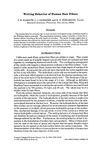10 citations,
March 2005 in “International Journal of Cosmetic Science” Oxidation changes human hair by breaking down fats and forming new acidic groups, affecting how it interacts with conditioners and cosmetics.
2 citations,
July 2023 in “Cosmetics” Surfactants in shampoos and conditioners remove some but not all lipids from hair, and more research is needed to understand their full impact.
 October 2024 in “Cosmoderma”
October 2024 in “Cosmoderma” Proper hair care and suitable products are essential for men's scalp health and well-being.

Hair fiber research combines multiple sciences to improve hair care products.
103 citations,
December 2021 in “Journal of biological rhythms” Shift work disrupts the body's natural clock, leading to health problems.
83 citations,
August 2020 in “Resources” Macroalgae compounds offer sustainable, effective benefits for cosmetics.
37 citations,
February 2010 in “Psychoneuroendocrinology” Androgen self-administration might be controlled by membrane receptors, not nuclear ones.
30 citations,
August 2021 in “Journal of Ethnopharmacology” Akebia quinata and Akebia trifoliata have many health benefits and potential medical uses.
8 citations,
April 2021 in “Journal of Clinical Investigation” Finasteride reduces opioid use and withdrawal symptoms in animals.
 5 citations,
February 2022 in “Acta Biomaterialia”
5 citations,
February 2022 in “Acta Biomaterialia” Nanomaterials can improve hair care products and treatments, including hair loss and alopecia, by enhancing stability and safety, and allowing controlled release of compounds, but their safety in cosmetics needs more understanding.
 2 citations,
February 2019 in “JOJ dermatology & cosmetics”
2 citations,
February 2019 in “JOJ dermatology & cosmetics” Anagen grow, a herbal hair serum, effectively promotes hair growth and could be an alternative to finasteride and beneficial for Minoxidil users.
 March 2024 in “Translational Journal of the American College of Sports Medicine”
March 2024 in “Translational Journal of the American College of Sports Medicine” Athletic trainers are crucial in spotting and managing eating disorders in athletes.
February 2024 in “Neurophotonics” Light therapy on the brain shows promise for treating brain diseases and improving brain function.
 July 2023 in “International Journal of Cosmetic Science”
July 2023 in “International Journal of Cosmetic Science” Biopolymers are increasingly used in cosmetics for their non-toxicity and skin benefits, with future biotech advancements likely to expand their applications.
 June 2023 in “Stem cell reviews and reports”
June 2023 in “Stem cell reviews and reports” Stem cell therapies could be a promising alternative for hair loss treatment, but more research is needed to understand their full potential and safety.
Stem cell treatments show promise for hair loss but need more research.
 April 2024 in “Cosmetics”
April 2024 in “Cosmetics” Different oils affect hair flexibility and strength, with their impact varying on whether hair is virgin or bleached.
 1 citations,
September 2023 in “Stem cell research & therapy”
1 citations,
September 2023 in “Stem cell research & therapy” Mesenchymal stem cells could help treat aging-related diseases better than current methods.
 95 citations,
December 1980 in “The New England Journal of Medicine”
95 citations,
December 1980 in “The New England Journal of Medicine” Minoxidil helped bald patient regrow hair.
 61 citations,
April 2009 in “British journal of dermatology/British journal of dermatology, Supplement”
61 citations,
April 2009 in “British journal of dermatology/British journal of dermatology, Supplement” Docetaxel and paclitaxel for breast cancer can cause permanent, severe hair loss.
 41 citations,
October 2000 in “Dermatologic clinics”
41 citations,
October 2000 in “Dermatologic clinics” Better hair care products are needed to protect against grooming and chemical damage.
 30 citations,
December 2014 in “Toxicological Research”
30 citations,
December 2014 in “Toxicological Research” Peppermint oil can effectively promote hair growth without being toxic.
 May 2016 in “The Journal of Sexual Medicine”
May 2016 in “The Journal of Sexual Medicine”  127 citations,
June 2008 in “British Journal of Clinical Pharmacology”
127 citations,
June 2008 in “British Journal of Clinical Pharmacology” Low doses of some substances can be beneficial, while high doses can be harmful or toxic.
 67 citations,
May 2010 in “Journal of The American Academy of Dermatology”
67 citations,
May 2010 in “Journal of The American Academy of Dermatology” Some chemotherapy can cause permanent hair loss.
 65 citations,
March 2016 in “Lasers in Medical Science”
65 citations,
March 2016 in “Lasers in Medical Science” Most low-level light therapy studies did not accurately report how light was measured, affecting treatment reliability.
 62 citations,
February 2011 in “Expert review of dermatology”
62 citations,
February 2011 in “Expert review of dermatology” Scalp cooling can reduce chemotherapy-induced hair loss and should be available in all hospitals.
 55 citations,
October 2003 in “Dermatologic Clinics”
55 citations,
October 2003 in “Dermatologic Clinics” Different hair care practices and conditions affect African American hair and scalp health, requiring specialized knowledge for treatment.
 52 citations,
August 1978 in “Journal of Applied Polymer Science”
52 citations,
August 1978 in “Journal of Applied Polymer Science” Human hair's ability to get wet is complex and can change with treatments, damage, and environment.
 32 citations,
August 2015 in “Anais Brasileiros de Dermatologia”
32 citations,
August 2015 in “Anais Brasileiros de Dermatologia” Black women's unique hair characteristics and styling practices can lead to specific scalp conditions, which require early diagnosis and appropriate treatment.




















